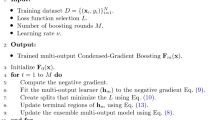Abstract
Cascade generalization sequentially composes different classification methods into one single framework. However, the latter classification method has to be up against a larger attribute set. As a result, its learning process will slow down, especially for the data sets that have many class labels, and for the learning algorithms whose computational complexity is high with respect to the number of attributes, among others. This paper is devoted to propose several variants of the original cascade generalization, where the basic idea is to reduce the number of augmented attributed each time in the Cascade framework. Extensive experimental results manifest that all the variants are much faster than the original one as supposed. In addition, all the variants have achieved a little reduction of error rates, compared with the original Cascade framework.
Preview
Unable to display preview. Download preview PDF.
Similar content being viewed by others
References
Blake, C.L., Merz, C.J.: UCI repository of machine learning databases. University of California, Irvine, CA (1998), http://www.ics.uci.edu/~mlearn/MLRepository.html
Gama, J., Brazdil, P.: Cascade Generalization. Machine Learning 41, 315–343 (2000)
Author information
Authors and Affiliations
Editor information
Editors and Affiliations
Rights and permissions
Copyright information
© 2006 Springer-Verlag Berlin Heidelberg
About this paper
Cite this paper
Xie, Z. (2006). Several Speed-Up Variants of Cascade Generalization. In: Wang, L., Jiao, L., Shi, G., Li, X., Liu, J. (eds) Fuzzy Systems and Knowledge Discovery. FSKD 2006. Lecture Notes in Computer Science(), vol 4223. Springer, Berlin, Heidelberg. https://doi.org/10.1007/11881599_62
Download citation
DOI: https://doi.org/10.1007/11881599_62
Publisher Name: Springer, Berlin, Heidelberg
Print ISBN: 978-3-540-45916-3
Online ISBN: 978-3-540-45917-0
eBook Packages: Computer ScienceComputer Science (R0)




